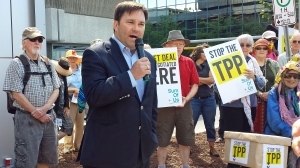The APEC (Asia-Pacific Economic Cooperation) Summit was held on November 20 2016, in Lima, Peru. The Cooperation which consists of twenty-one member countries including Canada, China, Japan, the United States and Russia, was created in 1989 in order to facilitate economic development and free trade between the countries that border the Pacific Ocean. The theme for this year’s summit was “Quality Growth and Human Development”, and discussions were held on how to eliminate inequality and promote simultaneous economic and human growth.
This year, the main concern for this summit was to alleviate fears of protectionism, especially concerning the policies of President elect Donald Trump in the United States. With Trump promising to back out of agreements such as NAFTA and NATO, the concern in the summit was palpable as his economic policies could undo the ratification of the Trans-Pacific Partnership (TPP). While the current President Barack Obama assured the summit that the TPP would continue, it is highly unlikely that it will pass under the Trump administration.
What is the TPP?
The TPP is a trade agreement between twelve nations around the Pacific Ocean. The ratification of the treaty would immediately open the largest free-trade zone between countries such as Canada, Japan, Australia, the United States, and Mexico. The agreement is responsible for forty percent of world trade, however the agreement does not include China. Many tariffs would be eliminated from various goods and services such as textiles and clothing, agricultural and industrial goods. For Canada, all of its key exports would have their tariffs slashed. Proponents of the TPP state that it would also increase environment and labour rights across the countries, and ‘set high standards for international trade and investment’.
Objections against the TPP
Criticisms of the TPP have been many and varied across different public interest groups, vulnerable populations, and national governments. There have been discussions of the investor-state dispute settlement (ISDS) clause in the agreement, with critics alleging that it would allow multinational companies to challenge laws in the nation that they are working in and would undermine national sovereignty. The United Nations (UN) Special Rapporteur for Indigenous Rights states that transferring more power to transnational firms through the ISDS clause will undermine indigenous land rights, and that indigenous groups were not consulted during discussions. In Canada, the Green Party published a wide condemnation of the agreement, arguing that the free trade zones would worsen local farmers’ conditions by inviting cheap imports to compete against domestic goods. Many groups will be glad to see the demise of the TPP.
The Future of the TPP: What about China?
In order for the TPP to pass, six countries that hold 85% of the total economic output of the group must ratify the deal by February 2018. This must include Japan and the United States, the two biggest economic giants in the deal. With Congress preparing to reject the deal and Donald Trump proclaiming the TPP will be nixed on the first day of his assignment, it is very unlikely that it will pass without renegotiation.
This could indicate the rebalancing of trade deals to centre towards China, as President Xi Jinping stated that his country will continue endorsing economic globalization. China is also currently developing a Free Trade Area of the Asia-Pacific (FTAAP) deal, which will increase the flow of trade and goods in the Asia-Pacific area. Since main competitor United States is turning towards isolationist rhetoric and the subsequent rejection of the TPP, China can be poised to become the economic giant in global trade, especially in the APEC. While the APEC summit can be considered as a successful meeting between many nations on developing economic and political cooperation, the future of the TPP is rocky and is a sign that international free trade could decline in favor of domestic development.
Photo: “Stop Fast-track rally in D.C” (2014), by AFGE via Flickr.com. Licensed under CC BY 2.0.
Disclaimer: Any views or opinions expressed in articles are solely those of the authors and do not necessarily represent the views of the NATO Association of Canada.




